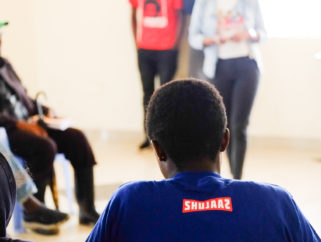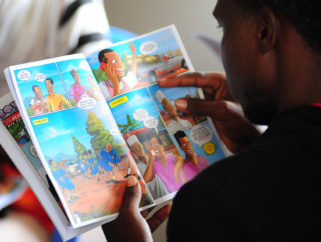It’s a tough road to education and girls need our help – part 2 [ARCHIVE]
- Gender
- 26 Jun 2017
In part one of this blog we explored why so few girls complete secondary school in Tanzania (just 30%) despite starting their schooling with big dreams, aspirations and life goals. We shared our findings about two differing views to girl education that are prevalent in Tanzania – a modern supportive & encouraging view versus a traditional view which fails to support girls as they struggle through the many challenges they face as they attempt to complete their education.
The truth is, girls aren’t really in control of whether they complete their education or not. Rather the control sits with their families and the community they grow up in. Which explains the low levels of confidence girls have in their ability to complete education – only 46% of girls are “fully confident” that they will transition from primary to secondary school – when they grow up in a community that ascribes to the ‘traditional view’.
Take for example the recent announcement made by Tanzania’s President John Magufuli that pregnant schoolgirls will be banned from school and unable to return once they’ve given birth. How can anyone be fully confident that they will achieve something, if they are not in control of it? Even worse, how can they feel confident when pretty much every person around them makes sure to highlight that girls are not good enough for schooling just because they are girls?
This led us to ask another big question – who can best support girl education and what can they do to ensure girls succeed?
Young people in our audience believe that for a girl to benefit from education, five key stakeholders have to work together to make girls’ aspirations a reality.
These stakeholders are:
Family: must prioritize girl child needs just as they do for boys
Community: must understand the importance and value of girls’ education for the girl and for the community as a whole
Government: must enact policies that ensure girls education prevails
Schools: must deal with teacher sexual harassments and insecurity at schools
Girls: must believe in themselves that they can succeed
When these five stakeholders collaborate and each play their part, girls will be much less likely to drop out of school (especially as a result of getting pregnant) and society as a whole will not miss out on benefitting from the contribution an educated and confident girl can make.
In collaboration with DFID funded project EQUIP, Shujaaz is creating media to build girls’ confidence and to help them understand and overcome the challenges they will encounter on their way into adulthood. We are also organizing events that bring together various stakeholders to generate a discussion around girl education and the potential of an educated girl.
What about you, what is your role as a stakeholder? What is your contribution in making our girls succeed?
By Winnie Nyato: Research Coordinator, Shujaaz Tanzania


![The Flip Side of Girl Empowerment? [ARCHIVE]](https://www.shujaazinc.com/wp-content/uploads/2020/01/girl-empowerment-blog--321x242.jpg)
![Sharing is caring: barriers to girls’ education in Tanzania [ARCHIVE]](https://www.shujaazinc.com/wp-content/uploads/2020/01/pupils3.JPG-321x242.png)
![JongoLove inspires girls to talk love, life and sex [ARCHIVE]](https://www.shujaazinc.com/wp-content/uploads/2020/01/Coming-Soon-Link-Image-321x242.jpg)
![CHILD BRIDES & THE PROMISE OF CHANGE IN TANZANIA [ARCHIVE]](https://www.shujaazinc.com/wp-content/uploads/2020/01/BKM_0671-321x242.jpg)